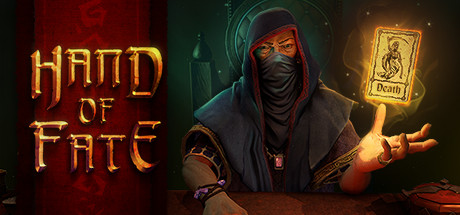
Hand of Fate
Hand of Fate is less than the sum of its parts. In fact, it might have the widest gap of any game I’ve played between the expected quality of the sum of its parts and its actual quality. It’s a roguelike deck-builder, but rather than being one more instance of a famously overdone genre, it’s actually one of the genre’s progenitors, predating Slay the Spire by two years. But even without that knowledge, it’s a remarkably original game. Unusually, players maintain two decks: one for the protagonist’s potential equipment, and one for the events and locations that can transpire during a run. Upon successful completion, many encounter cards will unlock not only new equipment cards but new encounters that directly follow the first, integrating side quests into the main campaign via the deck itself. And then, of course, there’s the significant fact that combat encounters play out using the mechanics of Batman: Arkham Asylum.
It sounds like a terrific combination, but the ways in which the pieces are combined (and in some cases, not combined) leave a lot to be desired. The “overworld” put together from drawn encounter cards is chance-based to a perplexing degree. There’s the randomness expected of a deck-builder, but then nearly every card generates at least one luck-of-the-draw moment on top of that. This half of the game is most akin to interactive fiction along the lines of Sorcery! or 80 Days. Keeping in mind that the unpredictable nature of those games was already arguably their biggest flaw, they still mostly got away with it because their minimal gameplay simply couldn’t support much else. Hand of Fate, in contrast, has a fully-fledged action RPG component that it just ignores for non-combat events. So no matter how powerful and experienced you become, your character can always die from things like failing to swim across a river because you picked heads instead of tails.
Another thing that Hand of Fate doesn’t understand about interactive fiction is that it ideally features an interesting setting and a fleshed-out story. The nature of the protagonist, the dealer, and the card game they’re playing is the core mystery in Hand of Fate. It very conspicuously calls attention to this and then equally conspicuously never addresses any of it, leaving behind only the most by-the-numbers fantasy tale. The action gameplay is at least more serviceable. It would be exceedingly difficult to make a bad example of Arkham Asylum combat, so while this version does feel less impactful and polished than its inspiration, it still attains the all-important sense of flow and has enough depth to remain consistently engaging. Lack of camera control is a regular annoyance, but its largest issue is the inverse of the overworld’s largest issue: if you’re good enough at it, nothing you did in the overworld will even matter. Testing for both luck and skill is reasonable, but having them constantly nullify each other is distinctly unsatisfying.